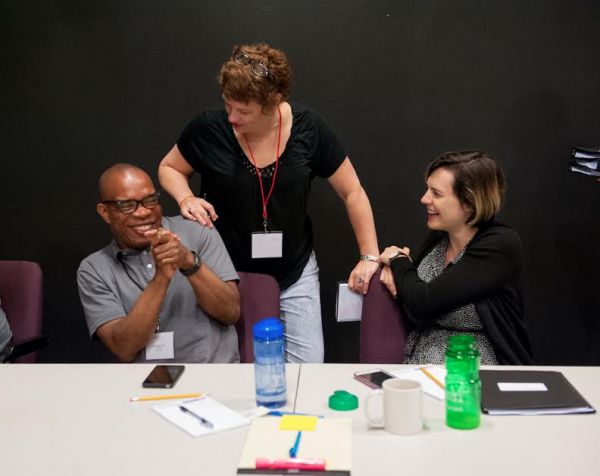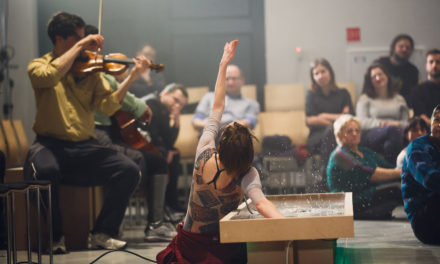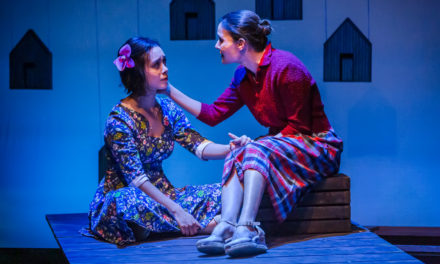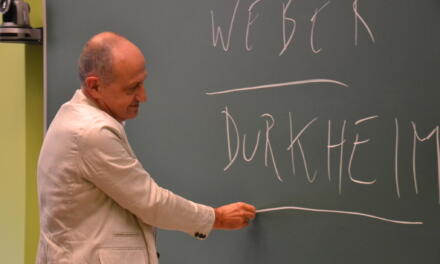Dramaturgs have always been part of each team working at PlayPenn. But since 2012, its Rent-a-Dramaturg program, has rendered them rentable, and they’re everywhere. Sure, the 12-year-old new play development conference focuses on the primacy of the playwright, or what the organization’s associate director Michele Volansky referred to as “the old-fashioned ye olde text-based work.” But dramaturgy is built into its fabric, and with Rent-a-Dramaturg, playwrights and dramaturgs are matched in working pairs for feedback sessions.
Alchemy, curation, and community
Rent-a-Dramaturg rates range from $200 to $250 (for script review, consultation, and a post-revision conversation). Abby Millager, a poet from Newark, Delaware, used the program for feedback and guidance on her first play, which has since earned an award, inspired her to form a local playwriting group, and will have a reading in August. She reflected on her experience as “farm-to-table with the help of a PlayPenn dramaturg.”
So what do dramaturgs actually do? They can provide context for the world of a play in many ways, including writing background materials for actors and audiences, working directly with playwrights, and leading discussions in public and publications. When working with a playwright on a new play, dramaturgs are often the first audience providing feedback and ideas for revisions.
Volansky and Jacqueline Goldfinger, PlayPenn’s director of education, are dramaturgs as well as writers and professors, and PlayPenn artistic director Paul Meshejian recalls that when he started out as an actor and director, he was his own dramaturg. He says, “You did your own work, you learned structure, assessed the structure of the play, learned what the nature of the language is.” At PlayPenn, he says, everyone has a dramaturgical perspective. “We look for directors who have dramaturgical capacities, because the job here is not getting something up on its feet, not making pictures, not tracking movement but trying to find how that can be codified in a text. We are dramaturgically based, no question.”
Education and dramaturgical secret sauce
Goldfinger’s predecessor, Sarah Mantell, created the Rent-a-Dramaturg program as a version of what freelance dramaturgs do all the time: Pair up with a playwright to read, consult, and give notes. As Volansky recalled, the program was born to address questions their playwrights were asking: “I have a play that needs work. How do I do it by myself?”
It works like this: A playwright sends PlayPenn a draft of a play and a completed survey. She is then matched with a dramaturg who will read the submission and conduct a 90-minute conversation with her. Goldfinger says, “Rent-a-Dramaturg is for playwrights who have a full-length play and are ready to work on it rigorously…. The playwright gets one-on-one attention from someone who has a special skill set based on the needs of their play.”
Before her current position, Goldfinger was an instructor, playwright, and dramaturg at PlayPenn. She now curates and runs all their public classes and workshops. “We concluded that to have a thriving new-work community, you need more than just playwrights. You need directors who understand how to stage it, dramaturgs who understand how to talk about it, actors who understand how to act it, and designers who understand how to interact with it. So we started looking at the new play process in education more holistically.”
While classes and workshops constitute the bulk of PlayPenn programming, Rent-a-Dramaturg and Application Review (getting editorial feedback on playwright submissions to grants, workshops, and other competitions) assist in creating what Volansky calls “that mysterious secret sauce of play development.”
Community and communion
Meshejian notes that he and Volansky had deep experiences in other theater companies before creating PlayPenn. Meshejian’s resumé includes the Playwrights’ Center in Minneapolis, and Volansky worked at Actors Theatre in Louisville, Steppenwolf in Chicago, and Philadelphia Theatre Company; they were experienced dreamers. He says, “We thought there was another way to focus the work that is more supportive for writers and less about creating a shopping mart.”
From the beginning, PlayPenn was community-wide and year round, not something you left your life to attend like other conferences and workshops. Meshijian says, “This sort of vision is about Philadelphia first, and we make no bones about it. The fact that we have a national profile is in part good luck, in part we have good taste, and in part we make conditions so directors and writers want to come here.”
Goldfinger enthuses about PlayPenn building a “fertile story-based community” through programs; Volansky invokes “secret sauce” and intuition, and Meshejian returns to the idea of community and communion. “When I started working in the theater,” he notes, “the man who I trained with had been part of the Little Theatre Movement. What I gleaned from him was that what we do is we make communion. We are about community. We create community, we engage with community, we are community.”
This article was originally published on Broadstreetreview.com. Reposted with permission. Read the original article.
This post was written by the author in their personal capacity.The opinions expressed in this article are the author’s own and do not reflect the view of The Theatre Times, their staff or collaborators.
This post was written by Martha Steketee.
The views expressed here belong to the author and do not necessarily reflect our views and opinions.


















